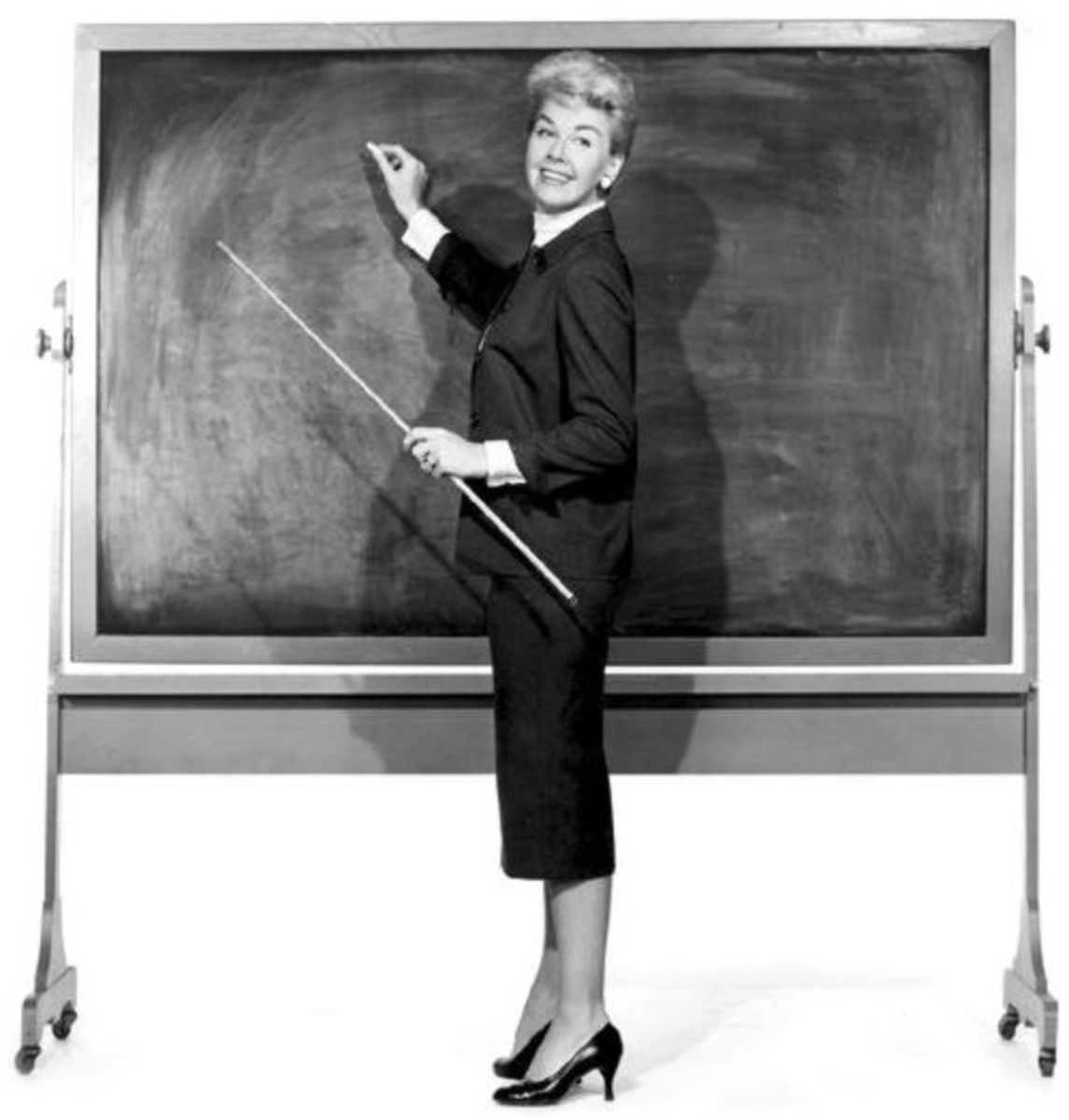Why America's Schools Fail: Part VI-C: Teacher's Unions
Why America's Schools Fail
By Dr. Robert Sprackland
Part VI. DEFINING THE PROBLEMS: Failures in GOVERNMENT AND SOCIETY Politics and science
(Note: these chapters and sections are being published as they are completed and edited. Tpoics that will be covered in this chapter include the following:
Teacher pay and social status, Politics and the curriculum, Who do teacher's unions represent and What is education?)
Teacher licensing and standardized tests - grade school vs. tertiary teacher prep; preparing for a profession or a trade? - Who do teacher's unions represent anyway? - Teacher pay and social status - Why are school boards impotent?-What are the unions trying to do? - Class length, start times, and teacher contracts - The yo-yo policies of Kansas.
C. Who do teacher's unions represent anyway?
There is so much wrong with the U.S. school system that blame can spread to everyone involved, including the teachers. Granted that most of the teacher's problems are inflicted on them from on high, but their failure to do anything meaningful about the problem is something they are potentially able to address. The major obstacle they face is the behemoth known as the Teacher's Union. Like a great whale, it is a huge and bloated organism, its weight matched by very few other political entities (maybe the AFL-CIO and National Rifle Association), yet toothless and an easy target for smaller and more predatory creatures.
Teacher's Unions are proof that teaching is still a trade and not a profession. True, teachers are salaried employees, but that simply means they have been conned into jobs where they work considerable overtime with no additional compensation. But look at the other realities: they work as groups under collective bargaining, are treated as a distinct group from other purported educators (i.e., principals), and typically required to belong to the union as a condition of employment. What is it unions do for education? In almost all cases, nothing. Unions fight for percentages paid by districts for health insurance, or an extra five minutes of lunchtime, and similar workplace concerns. But do unions argue that districts must hire properly trained teachers, or that curricula should be designed and set by appropriate academic departments? Hardly, and this is why teachers are left so helpless. The big unions are not major players in defending teachers who want to teach science instead of creationism, geology instead of Genesis, or point out that the Confederacy lost the Civil War (a sore point for some teachers in the southern states).
But unlike school boards, which often prohibit teachers from membership, teachers unions are made up almost entirely of teachers! True, teachers take a big interest in their pay and benefits, but why don't unions also address working conditions? WHY don't teachers drive curriculum for their schools? WHY do teachers have so few options in dealing with school violence? And WHY are teachers required to hold malpractice insurance to cover problems generated by school boards?
Let's tackle that last problem first. When I taught in public high schools, I was required to be a member of the state teacher's union. There was no debate, dues were docked from my check every payday. Included in my package of benefits was a malpractice insurance premium, giving me $1,000,000 (that's one million dollars) in coverage should someone down the pike want to sue me. Now I am a biology teacher, so I won't be sued because a graduate cannot read or write, so I wondered what I could possibly do wrong to cause me to need a million dollars worth of protection. My colleagues pointed out that a student could set himself on fire during lab, or drink a poison. (I always prefaced our first lab session by teaching my students the age-old lab warning poem: "Little Willy's dead and gone/alas, he is no more/'Cause what he thought was H2O was H2SO4" the last being sulfuric acid.) More frightening, though, was the warning that if I gave a student a low grade, I might someday be accused as having molested that child, and that would certainly require a costly legal defense. So from day one, our unions are there to protect us from our students. Not exactly encouraging, but by the same token it is understandable. The 1980s and 1990s saw book after book of celebrity confessions about how the stars had been abused by their fathers, until the public at large seemed to think it fashionable to claim that they, too, had been abused. Who has longer access to children than their teachers, after all, and you can see the concern by the union on behalf of teachers. The charge doesn't have to be true to land you in court, after all.
Armed with my teaching credential, employment contract, and union membership, I successfully taught for the next two years in a high school in what was then the second most affluent district in America. Here I encountered the offspring of overnight Silicon Valley multi-millionaires, whose parents had bestowed on them luxuries that had not been earned. One student who was failing my biology class informed me that he didn't need my grade because his dad had a job ready for him when he graduated, and besides, his "car is worth more than my annual salary." This was true. The student parking lot contained Audis, Jaguars, Mercedes, and such that I referred to it as the local "Pretentious Motors Lot," while the teacher's section looked more like salvage waiting to be turned into scrap metal. The student ultimately failed both my class and another, and did not go to college. Presumably, he worked for dad at six figures until the high-tech crash of 2001.
But most of my students responded well to something I had been strongly advised by colleagues and the principal to avoid: discipline. That first week of school I gave my kids the speech I now consider my standard opening, about how I'll be their best friend if they want to succeed, and their worst enemy if they don't. Here is my syllabus, our class contract, and it explains how grades are earned (never "given"). Forget bribery, because if I was interested in money I'd have studied law and gone into politics. Don't do your work, and you get a flunk; cheat and you get a flunk plus a trip to the principal, with a note by me for your permanent record. The students were surprised at first, because I actually expected them to work, to study, to do homework. The first challenge came after the first grading period, when I flunked half the class. My principal called me to his office, and explained that this was an unacceptable failure rate. I agreed. Didn't I realize that my expectations were damaging the budding egos and self-esteem of my tenth grade class? No, I replied, nor did I care. Students won't respect themselves or their accomplishments unless they know they've earned the credit. False praise, I countered, is the real enemy of self-esteem.
In that state, law allows that only teachers may alter grades, so despite harassment by the boss, the Fs stayed. Next grading period, though, the kids understood that I would not change my stance, nor could the principal (bullied by some parents) force me to recant. There were far fewer failures that next period, and in the end I received superlative reviews from the students and a few thank you notes from parents.
But I was not destined to stay a public school teacher in that state. I present my story because it is a fairly common one among experienced teachers and because it is most familiar to me. It answers in part the question of why more than 50% of college graduates who enter the teaching field leave within the first five years.
By the end of my second year I was terminated. The superintendent, a decent fellow with a tough job in a posh district, was willing to be honest. If I was retained for a third year, I would automatically become tenured and have a permanent job. During my first two, or "probationary" years, I could be paid at the lowest rung on the pay scale, the same as a recent bachelor's graduate with no experience. If I were retained, I'd have to be credited with my two years at the school plus two earlier years at another school, thus a four-year salary. Add to that the bonus for my master's degree (a whole $500 a year!) and I was far too expensive. The district would instead bring in an intern from a local university, whom they not only would not have to pay, but would bring the school $1,000 to take him!
The failure of the academic system is not just manifest in the problems of teacher salary, but also in the lack of qualified teachers in the first place. We have far too many people teaching subjects about which they know precious little, and this extends far beyond the coach teaching biology or the English major teaching history. Having a bachelor's degree in math or science does not make one a mathematician or scientist. We can argue that science, math, and history are taught so poorly in America that were we to dispense with them from our schools, the adult population would hardly know the difference. At the university level, I had a colleague who had a third year history major remark, after a lecture about the First World War: "I always wondered why they called the war against the Nazis the Second World War!" He also thought that the War of 1812 had been fought in 1957, one of the few years in which the U.S. was not at war with anybody. In my university and college classes, I have had biology students who did not know what a cell was, could not explain organic evolution, and did not know that insects are animals, yet these same people where headed towards teaching jobs in the public schools.
Now supposedly our states have testing systems that are intended to screen the know-nots from the qualified candidates, and millions of dollars and lots of public relations exalt their value to society, but the schools still have teachers who are woefully ignorant of the subjects they are supposed to teach. Some wonderful examples of glaring errors I have heard in classrooms over the years, all by teachers certified to teach their subjects:
"Igneous rocks are rocks that can catch fire." Make them hot enough, and all rocks will catch fire.
"Sharks don't get cancer or other illnesses." Tell that to the vets at a public aquarium. Sharks get a whole host of nasty diseases, including the Big C.
"The Spaniards conquered the Indians because of their superior technology and military strategies." These, of course, followed their bringing germs that killed nine out of every ten Native Americans that they "conquered."
"Amphibians lay eggs in the water and go through a tadpole stage." True for most American frogs, but amphibians have more reproductive strategies than any other animals, and do not always have to go to the water to reproduce.
"The battle at the Alamo demonstrates how Americans will fight any odds to attain and defend freedom." Well, actually, the defenders of the Alamo were Mexican citizens (though many had come from the U.S.) fighting for independence from Mexico when the Mexican government started enforcing its laws against owning slaves. Oh, and the Texans were fighting to become an independent republic, not to become part of the United States.
These may seem trivial to the casual reader, but each statement reflects a gross misunderstanding about the very foundation material for each subject. To get these statements so wrong begs the question of how little does that teacher know about the rest of her subject?
In states such as Washington and Oregon, teachers are expected, if not required, to hold advanced degrees in their subject areas. For example, a teacher with a master's degree in education gets no credit on the job unless she also acquires, say, a master's degree in English (if she teachers literature). These states had someone awake enough (to be expected on Starbucks' home turf) to understand that professional knowledge really starts in graduate programs. It is after the bachelor's degree that students move past book learning to participation in a subject. Consequently, the powers-that-be who oversee statewide requisite criteria for the hiring of new teachers have insisted upon getting teachers with at least a solid university background in their respective subject areas. Not surprisingly, these states are also homes to some of the nation's best publicly funded universities and colleges, schools that rest on the reputations of their majority home-state educated student bodies.
In stark contrast are states where the requirements are considerably less lax. Thus, while many states now insist upon faculty having at least a few college credits in a subject they are going to teach, others allow so-called grandfather clauses to keep unqualified teachers in classes they would not presently be allowed. So while we still have coaches teaching biology or math, as those teachers age and retire the system increasingly bars their replacements from similar access to the classes without proper professional certification.
But among the older cadre of teachers can be found another problem. One highly talented English teacher of my acquaintance had been in charge of senior and honors level literature classes in our school for over fifteen years. But as budgets tightened and the board sought ways to oust the costlier experienced teachers, he was informed that the following year he would have to teach the biology class for remedial students. True, his first degree had been in biology, but he hadn't taught the subject in over fifteen years. While the nature of "Hamlet" or "A Christmas Carol" may remain static, biology is a quite dynamic field. Anyone who hasn't kept abreast of its new discoveries and ramifications will be hopelessly unprepared to teach a basic overview course. Worse yet, the remedial class was for the combination of low-achieving students who had to have one science class in order to graduate, and the body of non-English speaking students. Obviously, the teacher took the hint and, much to his disgust and regret, left the teaching field to retire.
As a nation, the United States laments its lackluster performance in math and science when compared to other nations. Consider the problem with math. Back in 1957, when America still thought of itself as innocent, the Soviet Union put the first satellite into orbit around the planet. With that first shot came the Space Race, an all-out effort by each country to beat the other to the moon and, by extension, domination of space. By 1960, schools across America geared up to train a generation of engineers, physicists, and rocket scientists. Math education had to be improved and accelerated, bringing forth the disaster known then as "modern math." Even the teachers seemed confused about teaching a class where priority was given to answers such as "two plus two is about five," and other worthless blather. I recall being taught binary math, adding long columns of zeroes and ones, with my teacher convinced that some day I might help program the big computers of the future, and I was equally convinced that I'd rather gargle with barbed wire than enter the space industry.
But while "modern math" left me, and my math skills, abysmally in the dirt, 1960s science was also getting a shot in the arm because of the perceived Soviet threat. Even by third grade I had learned enough basic physics, and seen enough screenings of atomic bomb tests, to know that the drill of "duck and cover," whereby we were to hide under our desks and cover our heads in the event of a nuclear attack, was less than a waste of time. If the "Red Menace" had ever dropped a bomb on central New Jersey, I knew I wouldn't have enough time to even think about kissing my posterior goodbye! But along with this knowledge came more exposure to the broader range of sciences. Rachel Carson was the excuse to shoehorn ecology into schools, and the miracles of DuPont, especially the invention of those heat shields used on returning space capsules that were commercially released as Teflon, became part of a wondrous world that beats the pants off Harry Potter's tales. After all, the new science and technology were real. Teachers had to scramble and take summer or night classes at local colleges to keep apace of the new world, and at that time the fascination for the subjects seemed to motivate them to do so. I doubt many of my grammar school teachers balked at "having" to take a summer class in physics or math.
Fast forward to 1988 when I was teaching in the district of great affluence. My department head had been teaching chemistry for twenty years, but had taken on a biology class that year because we were short of personnel. On his desk one day I saw his notes, dated "1967" and headed "genetics." I read the script and was astonished at how outdated the material he was teaching was. When I asked him if he was actually teaching from the notes, and politely pointed out that there had been a lot of advances in genetics in the past 21 years, he replied: "That's okay, the little sh&#s won't know the difference." At that point I had to wonder what other gaps existed in our chief science teacher's lessons, and about those in other schools. A few years later, as I visited many regional schools in my new job as a student teacher supervisor, I found that the problem was indeed widespread. It was as if, on a large scale, the old saying had come true: "Those who can, do; those who can't, teach."
In fairness I must swiftly add that the majority of those who could not teach were those teachers who a) were teaching outside of subject area competence, b) were like my colleague forced into teaching a subject they had left behind at least a decade earlier, and c) those who taught in the grammar schools grades, where one teacher is expected to teach everything. Those other teachers, still the majority, but a shrinking majority, are the dedicated people who trained to teach a subject (as opposed to those who just wanted "to teach") and do their jobs well every school day of every year. The problem teachers, those who suffer from conditions a) through c) above, are also not the problem. Rather, it is the administration that put them into their untenable positions in the first place.






